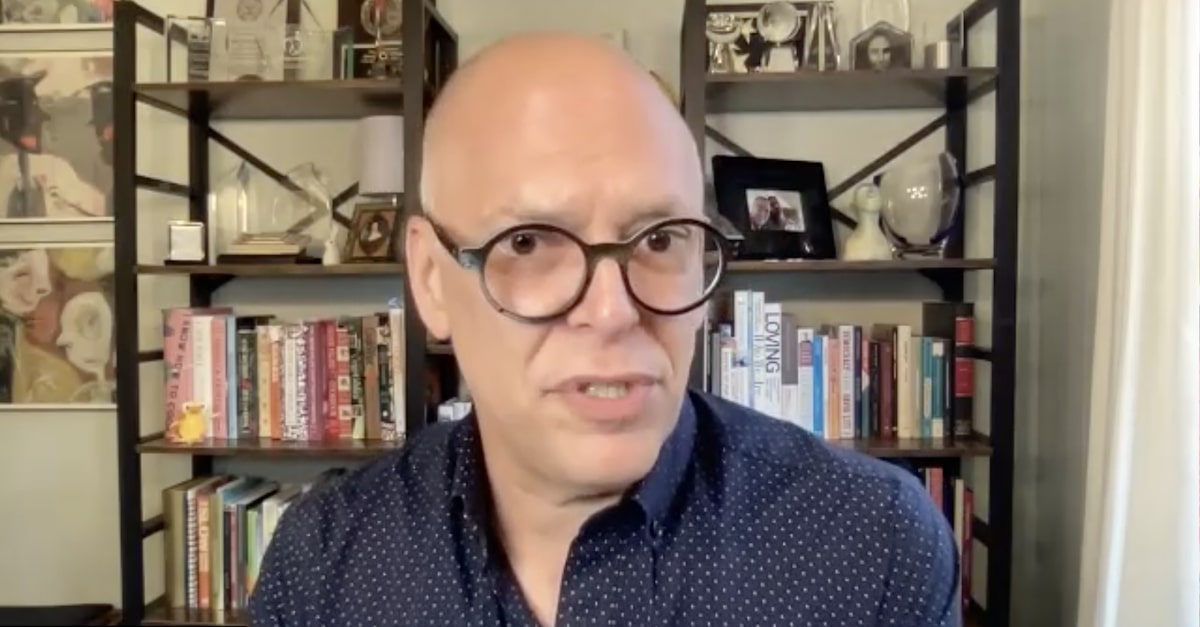
Jim Obergefell
Listen to the full episode on Apple, Spotify or wherever else you get your podcasts, and subscribe.
Before entering the Supreme Court to learn about its ruling for marriage quality, Jim Obergefell — the man behind the watershed decision — saw a sign of his impending victory on his admission slip.
“Every time I had been in the Supreme Court, the tickets were bright orange,” Obergefell reflected on the latest episode of Law&Crime’s podcast “Objections: with Adam Klasfeld.”
“On Friday, June 26 — that day, it wasn’t bright orange,” he continued. “It was lavender, and when we realized that we all thought, ‘Well, this has to be a sign. This has to be a positive sign. There’s no reason for the ticket to have changed color, let alone being lavender.'”
In an extended interview, Obergefell moves beyond the cold record of that case to reflect upon how he and his late husband John Arthur began their legal battle over their marriage. He describes how he became ordained to officiate weddings after his Supreme Court victory — and read the closing lines of the ruling that bears his name at “every” ceremony.
In the wake of the Supreme Court’s ruling overturning Roe v. Wade, Obergefell has been vocal about the possibility that his own decision will meet a similar fate — and urged the Senate to pass the Respect for Marriage Act, a bill fortifying marriage equality that found bipartisan support in the House of Representatives.
“I hope that the Republican senators who have not decided or who are thinking they will vote ‘no’: I simply ask you think about your own family,” Obergefell said. “Think about your marriage. Think about the marriages of the people you love your family members, your your friends. How can you possibly think voting no on something that means a marriage would disappear by virtue of crossing a border is the right thing to do? That’s harmful. That’s anti-family. That’s anti-American.”
With support for same-sex marriage having reached record highs, some GOP senators claimed to oppose the Respect for Marriage Act as unnecessary. The Dobbs majority — save for Justice Clarence Thomas, in a concurrence — insisted that no other rights previously established by Supreme Court precedent were on the chopping block as a consequence.
Obergefell did not buy it.
“The fact that in the Dobbs decision Justice Alito says that this decision should not be taken to mean or should cannot be applied to other other rights, that gives me no comfort whatsoever,” he said, noting that most of the justices on the majority seemed to testify during their confirmation hearings that Roe was settled law.
Thomas offered no such disclaimer, arguing without qualification that the court should revisit Griswold, which established the right to contraception; Lawrence, guaranteeing the legality of same-sex intimacy; and of course, Obergefell.
“This was Justice Thomas making clear his personal beliefs and what rights we currently enjoy that he believes we do not deserve, or that should be taken away,” Obergefell said. “So I very much believe it was personal.”
Obergefell describes that personal journey on the podcast, from the decision to get married after his now-late husband’s diagnosis with ALS, or Lou Gehrig’s disease.
“Within 14 months, he started at home hospice care, and I was his primary caregiver other than when the hospice nurses visited a couple of hours every week,” Obergefell said. “That’s what you do when you love someone. I mean, you take care of them no matter what, and we had talked about marriage early on in our relationship in the mid ’90s. We talked marriage because we wanted to get married, but we also both agreed that for us, it couldn’t just be something symbolic. It had to be something legal. It had to be a marriage that carried legal weight.”
Arthur did not live to see the day of their Supreme Court victory — but he did survive long enough for their win in the lower court, before the subsequent appellate battles.
Obergefell described the moment when then-Justice Anthony Kennedy recited the decision and the holding became clear.
“When I realized that, yes, he was saying we deserve the right to marry and to have those marriages recognized, I burst into tears,” Obergefell recalled. “And you could hear people around the courtroom sobbing. Our attorney later told me he’s never seen so many attorneys crying in a courtroom.”
“Of course, I thought, ‘John, I wish you were here. I wish you could experience this, I wish you could know that our marriage can never be erased,'” Obergefell continued. “And then I was hit by the realization that for the first time in my life as an out gay man, I felt like an equal American.”
Listen to the podcast, below:
(Photo from Zoom interview)